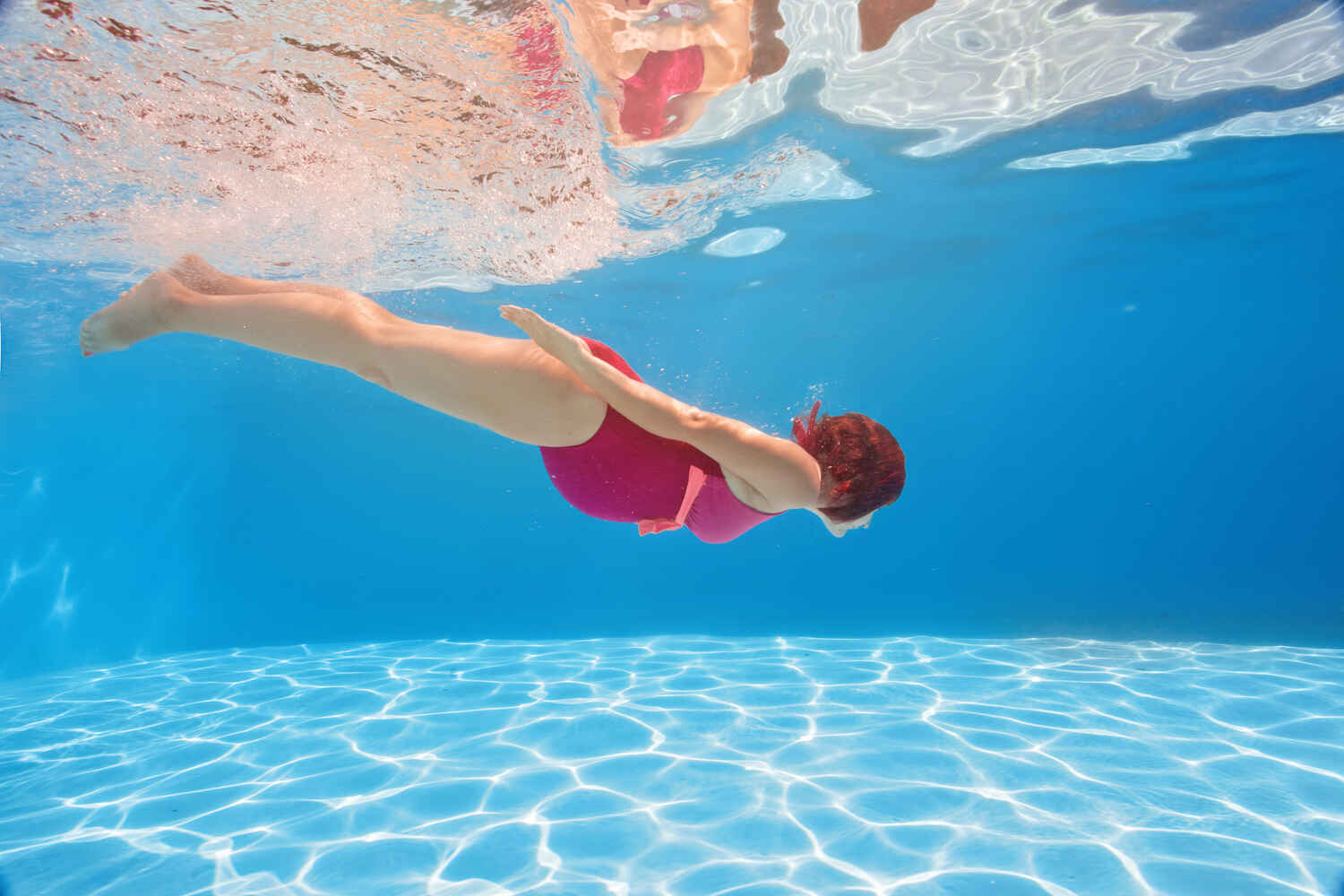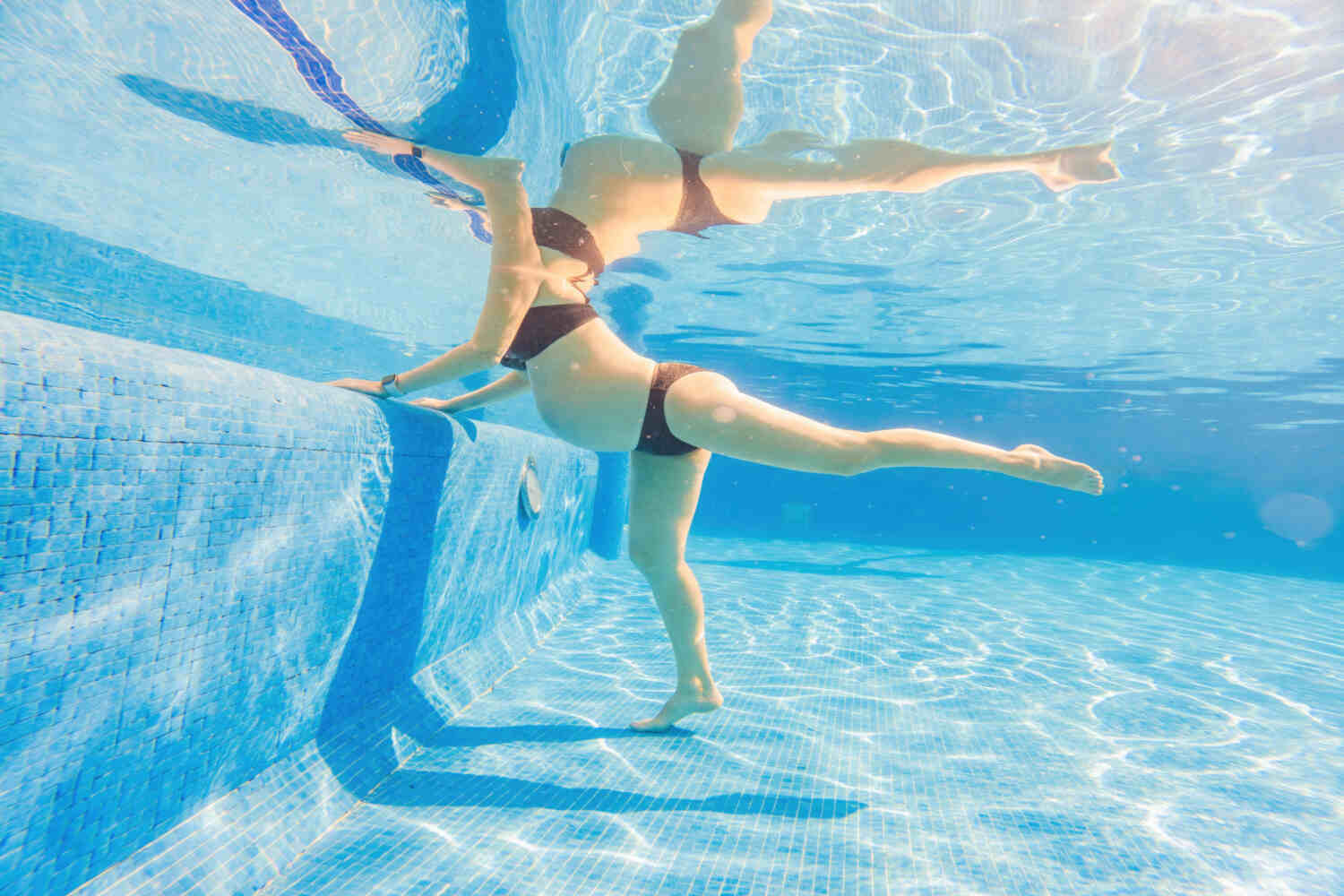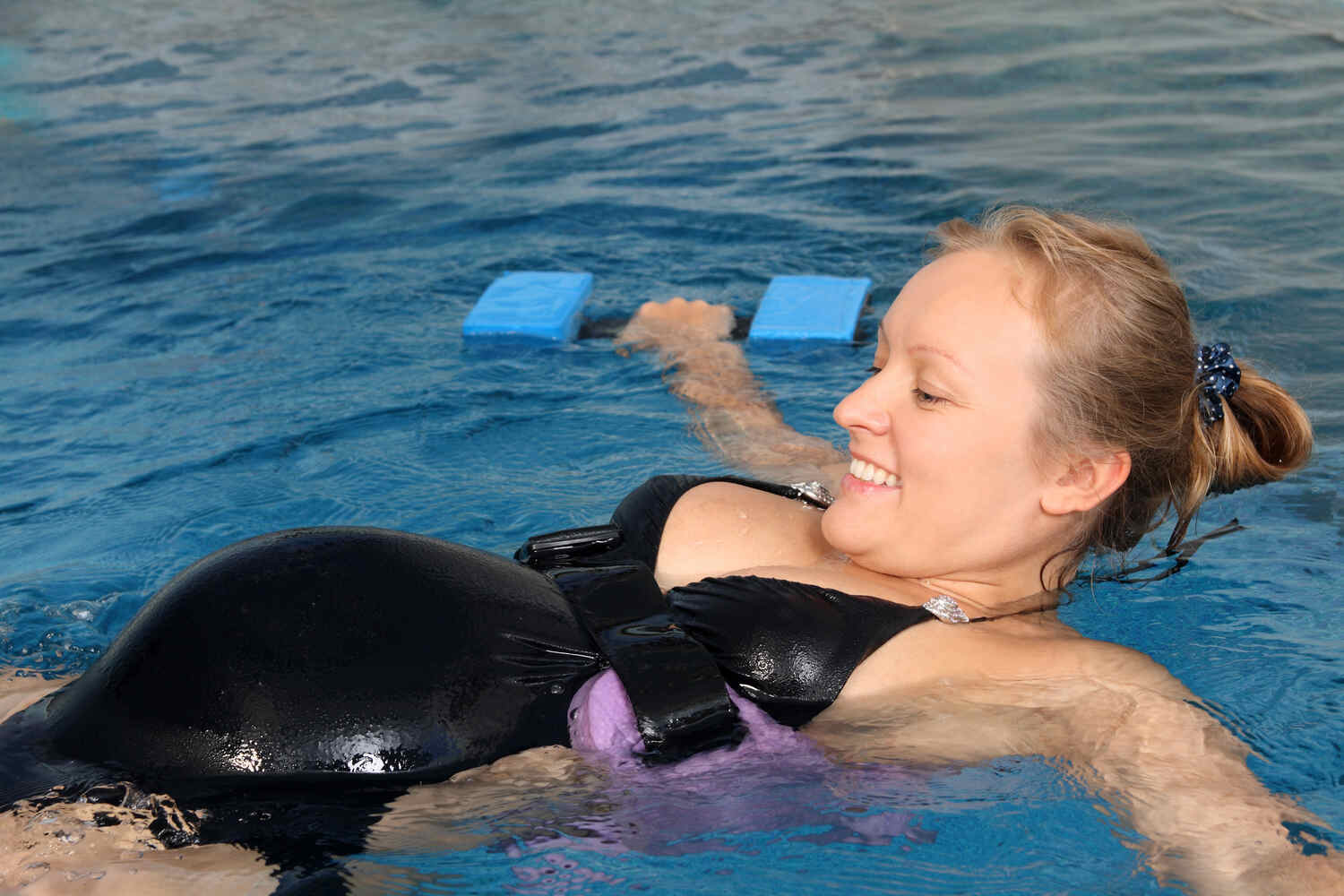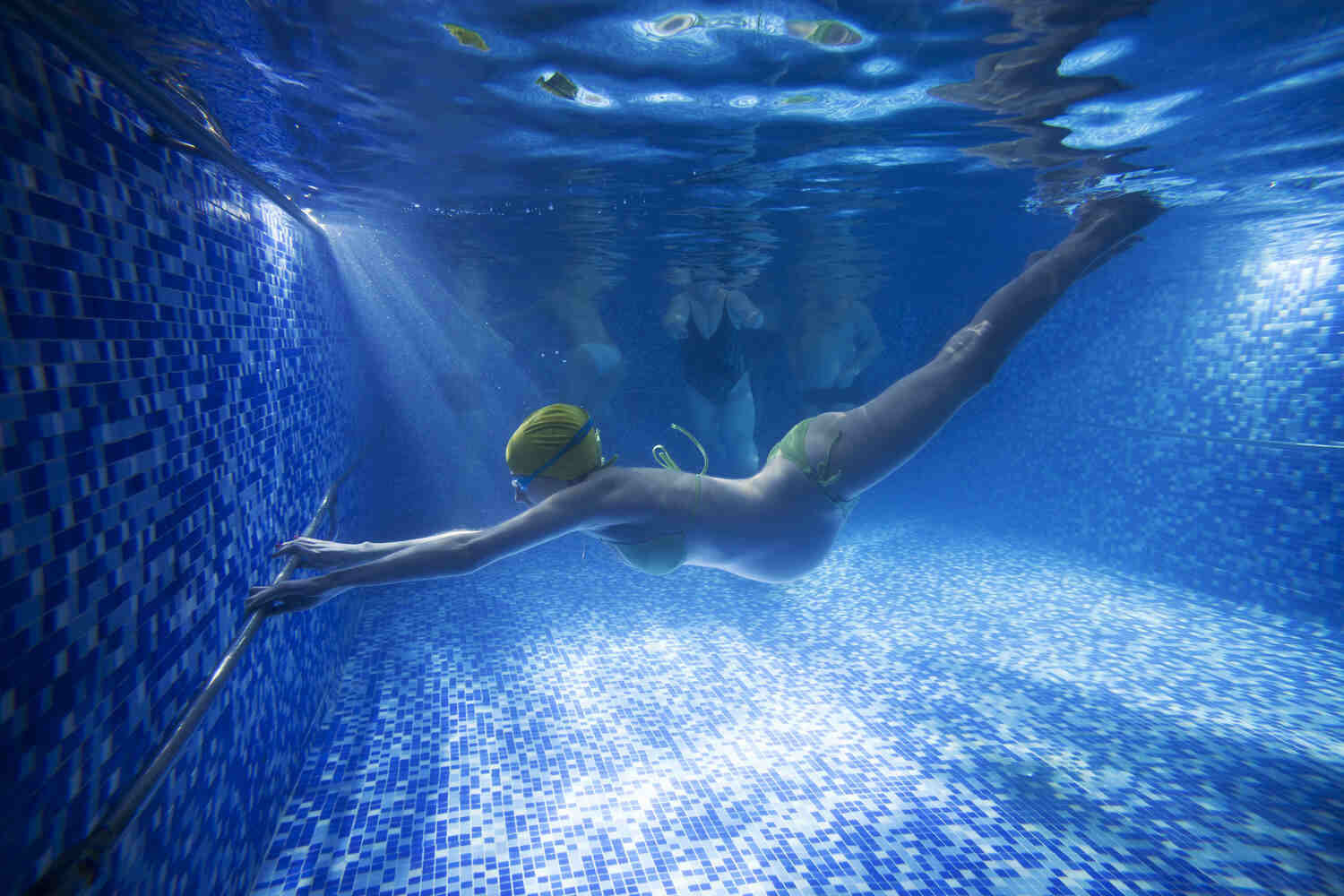
Swimming When You Are Pregnant – Safe or Not?
7 min readWritten by Simran Dolwani

 Swimming, as well known, is a great exercise. It not only helps you stay fit but also acts as a great stress buster. However, if you are pregnant, it might leave you wondering if it is safe to swim. Unlike the West, it is not conventional to see a fully pregnant woman wearing a bikini in a pool in India.
Swimming, as well known, is a great exercise. It not only helps you stay fit but also acts as a great stress buster. However, if you are pregnant, it might leave you wondering if it is safe to swim. Unlike the West, it is not conventional to see a fully pregnant woman wearing a bikini in a pool in India.
So, if you have any inhibitions around it we are here to break it for you.In this article, we will discuss everything you need to know about swimming during pregnancy. From benefits to risks, precautions, and more, we have created a comprehensive guide that will help you make better decisions.
In This Article
- Swimming During Pregnancy-Is It Safe?
- What Are The Benefits Of Swimming During Pregnancy
- Are There Any Risks If I Swim During Pregnancy?
- Precautions To Be Taken While Swimming During Pregnancy
- When Not To Swim During Pregnancy?
- What Trimester Is Best for Swimming?
- 4 Tips to Follow While Swimming During Pregnancy
- FAQ’s
Swimming During Pregnancy – Is It Safe?
Swimming is a great way to keep yourself fit, and healthy during your pregnancy. As per an NCBI study, swimming during pregnancy is one of the ideal exercises to reduce pain and improve body functionality [1]. You can swim during all the trimesters; however, if you have a high-risk pregnancy or any kind of pregnancy complication, then you should avoid it. Plus, you can continue swimming if you are already a good swimmer. However, start with short sessions after warming up and build the session strength gradually. Further, it’s a good idea to seek medical advice before considering swimming as your prenatal workout.
What Are the Benefits of Swimming During Pregnancy
 When it comes to swimming benefits, the exercise works on every muscle of your body. It’s a safe and comfortable activity that helps relieve stress or pressure from the mind and limbs. Moreover, it can help reduce your body heat if summer temperatures are soaring high. Besides, there are multiple benefits for swimming during pregnancy:
When it comes to swimming benefits, the exercise works on every muscle of your body. It’s a safe and comfortable activity that helps relieve stress or pressure from the mind and limbs. Moreover, it can help reduce your body heat if summer temperatures are soaring high. Besides, there are multiple benefits for swimming during pregnancy:
- It is a great prenatal aerobic and low-impact exercise that you can pursue during pregnancy. It does not hurt your joints and improves body functioning and metabolism while increasing oxygen uptake.
- Swimming can strengthen your core muscles while improving strength, endurance, and muscle tone. This eases pregnancy and ensures a safe delivery [2].
- The exercise can ease the stress on your spinal area caused by the forward expansion of your waist region. The water applies an upward thrust (buoyancy) that reduces pressure on the spinal joints.
- Like any good cardiovascular exercise, it will help you feel more energetic during the day. Plus, it can help reduce stress levels to ensure a good night’s sleep. and sleep better during the night.
- It helps you manage your weight. It helps maintain a healthy lifestyle and improves physical development to encourage regular workouts [3]. Plus, It can reduce swelling in your limbs (because of being submersed in water and increased blood circulation due to movement).
Are There Any Risks If I Swim During Pregnancy?
In general, swimming is a safe exercise. Nevertheless, it’s important to know the associated risks. It might not be a good choice for women with pregnancy complications or medical conditions. Although, the activity has an endless number of benefits. However, the label does not come without warnings.
- Swimming in a non-chlorinated pool is not a good idea as it increases the risk of spreading infections [4]. As bacteria and other disease-causing organisms may thrive in non-chlorinated water bodies, diving into them may lead to infections and skin irritation.
- Swimming in a heavily chlorinated pool is also not a good idea as the heavy concentration of chemicals is believed to increase the chances of birth defects and may cause allergies in your child [5]. If it is not possible for you to monitor the chemical concentration in the pool water, it might be a better idea to stay away. Although, you may consider swimming in pools with minimum chlorine concentration. According to the CDC (Centers for Disease Control and Prevention), 1 ppm is the ideal free chlorine concentration in the pool [6].
That said, if you are confident about the cleanliness of your pool, you can go ahead and wear your swimwear. But we urge you to take the below-mentioned safety tips seriously.
Precautions to Be Taken While Swimming During Pregnancy
 Low-impact exercises like swimming strengthen functionality and aerobic capacity. You can fetch the maximum benefits if you do it correctly and under medical guidance. Plus, you can take a few precautions to minimize the risks.
Low-impact exercises like swimming strengthen functionality and aerobic capacity. You can fetch the maximum benefits if you do it correctly and under medical guidance. Plus, you can take a few precautions to minimize the risks.
1. Ensure to have a good warm-up and gradual cool down before and after your swimming respectively. Choose the type and form of swimming carefully:
- During 1st trimester, it is beneficial to swim in the morning as it can reduce morning sickness and lethargy.
- During 2nd trimester, you can be more flexible with any swimming style and even do back strokes without risking back injury (as you feel weightless in water).
- During 3rd trimester, it is advisable to do breaststroke as it eases back muscles and uses more of the chest muscles
2. Wear appropriate swimwear. There is maternity swimwear available which you might have to consider in 2nd and 3rd trimesters. You can wear a two-piece bikini as it feels comfortable and gives your bump sufficient space. Or you can wear a tankini if you don’t want to reveal your tummy.
3. Ensure you are breathing steadily while swimming. Take deep breaths and exhale slowly.
4. Just like any other exercise, a good pre-workout meal is necessary for swimming as well.
5. Watch out for slippery floors around the swimming pool and near in shower area.
When Not to Swim During Pregnancy?
Swimming can be fun even when you’re pregnant. After all, it helps reduce pain and discomfort while relaxing your body. While you are swimming, if you experience any of the following, it is highly advisable to stop swimming and rush to the hospital.
- Vaginal bleeding
- Contractions in uterus
- Fluid break
- Pain in stomach region
- Dizziness/breathlessness
- Palpitations
What Trimester is Best for Swimming?
Swimming is a good workout to relax your body while being pregnant. You can swim during all trimesters; however, you may want to be extra careful during the third trimester as it’s the most crucial stage. The extra weight gain may come your way, making swimming slightly difficult. But, most women under normal circumstances find swimming a great exercise even in the third trimester. That’s because the water puts an upward force (buoyancy) to facilitate swimming while reducing pressure on the joints. So, if you’re into the third trimester, you may hop into the water. However, you can check with your healthcare provider to ensure you’ve normal vitals and no complications.
[Read : Exercises During Pregnancy For A Normal And Natural Delivery]
4 Tips to Follow While Swimming During Pregnancy
 In general, swimming is a safe aerobic exercise to ensure your overall well-being during this phase. If you’re a pro-swimmer and get into the water regularly, you may continue with that. Or if you’re an occasional swimmer, it’s the right time to dip your toes in. In any case, it’s important to consult your doctor to avoid complications. Additionally, here are some extra tips you can focus on to ensure a safe and enjoyable swimming experience.
In general, swimming is a safe aerobic exercise to ensure your overall well-being during this phase. If you’re a pro-swimmer and get into the water regularly, you may continue with that. Or if you’re an occasional swimmer, it’s the right time to dip your toes in. In any case, it’s important to consult your doctor to avoid complications. Additionally, here are some extra tips you can focus on to ensure a safe and enjoyable swimming experience.
1. Start Slowly
It’s good to start swimming slowly, instead of going with the flow. Do a quick stretch to warm up and prepare your body. Plus, you should not overstretch your body. Your comfort matters the most. If you’re experiencing pain, discomfort, or fatigue, you must stop immediately and get out of the water.
2. Keep Someone With Yourself
While heading to a pool or ocean for swimming on a hot, sunny day, you can ask your friends or family members to come along. This way, you will not only get good company but support to handle urgencies.
3. Stay Hydrated
Drinking the required amount of water is much needed to stay active. During pregnancy, the water requirement increases to improve fetal circulation and maintain good blood volume. According to NCBI research, 8 to 10 glasses of water is a daily requirement [7]. Since you might not feel thirsty when in the pool, create a routine where you drink well enough before and after your swim (also during your swim if you are in the pool for over 30 minutes).
4. Dive in Clean Water
Although pregnant women may dive in a chlorinated pool to swim, this may trigger nausea or skin irritation. Germs may thrive in local water bodies like pools, ponds, and oceans, leading to illness and discomfort. An NCBI research indicates that individuals diving in public and private water systems may be at risk for infection and irritation [8]. Hence, you must consult your doctor while planning a swimming session.
Swimming can be a great way to keep yourself moving and build your endurance levels during pregnancy, and it also helps you aim for a natural, normal delivery. Plus, it has the added advantage of not heating you up like other aerobic exercises. It’s a sweet and simple workout that you may want to do throughout the phase. Nevertheless, it’s good to consider its pros and cons, and your doctor’s advice to eliminate complications.
[Read : When NOT To Exercise In Pregnancy?]
FAQ’s
1. Can Chlorine Affect the Birth of My Child?
Some experts suggest that swimming in a pool with a normal amount of chlorine might not be concerning. It may not have a direct impact on your body or fetus. However, you can ensure to swim in a well-balanced chlorinated pool for a short duration to avoid irritation.
2. Is it Good to Join Aqua Natal Classes?
You may join aquanatal classes and try a few different strokes and exercises. These can relax your body, strengthen muscles, and improve your well-being. This can further ease your pregnancy and make the journey comfortable. Addedly, it’s good to perform these exercises under supervision.
3. Is Swimming in a Heated Pool Safe During Pregnancy?
Hot water pools with a temperature above 101 degrees Fahrenheit may not recommended for swimming during pregnancy. It’s suggested to keep the body temperature normal or 0.4 degrees higher than normal. You may swim in slightly warm water with a safe temperature between 98.6 to 100°F.
References –
- Is swimming during pregnancy a safe exercise?
[https://pubmed.ncbi.nlm.nih.gov/20110815/] - Pregnancy And Exercise
[https://www.ncbi.nlm.nih.gov/books/NBK430821/] - Water Exercise and Quality of Life in Pregnancy: A Randomised Clinical Trial
[https://www.ncbi.nlm.nih.gov/pmc/articles/PMC7068410/] - Environmental health aspects and microbial infections of the recreational water
[https://www.ncbi.nlm.nih.gov/pmc/articles/PMC9912523/] - Disinfection by-products in swimming pools and health-related issues
[https://www.sciencedirect.com/science/article/abs/pii/B9780081029770000111] - Water Treatment and Testing
[https://www.cdc.gov/healthywater/swimming/residential/disinfection-testing.html] - Nutrition Column An Update on Water Needs during Pregnancy and Beyond
[https://www.ncbi.nlm.nih.gov/pmc/articles/PMC1595116/] - Maternal swimming pool exposure during pregnancy in relation to birth outcomes and cord blood DNA methylation among private well users
[https://www.ncbi.nlm.nih.gov/pmc/articles/PMC6599635/]
Read Also: Boxing During Pregnancy – Is It Safe?

Simran Dolwani,Bachelors in Physiotherapy
Responses (1)
S
Susila Raman
Dec 05, 2015
When i was 16 I used to be a lifeguard at the local pool and I used to see loads of pregnant women swimming all the way through the pregnancy. It's definitely something I'll be doing I used to love swimming haven't done it for a few years now but I am planning to start again once I stop feeling so tired in the evenings
Want curated content sharply tailored for your exact stage of parenting?
Related articles

Honitus Syrup in Pregnancy – Is it Safe to Have?

Bamboo Shoots During Pregnancy – Is it Safe to Have and Top Benefits

Cranberries During Pregnancy – Top Benefits, And Risks

Excessive Yawning During Pregnancy – Causes And Treatment Options

Mental Health and Wellbeing During Pregnancy -Everything You Need to Understand

Breastfeeding Classes During Pregnancy – Top Benefits and Importance
Sponsored content
Discover great local businesses around you for your kids.
Get regular updates, great recommendations and other right stuff at the right time.





